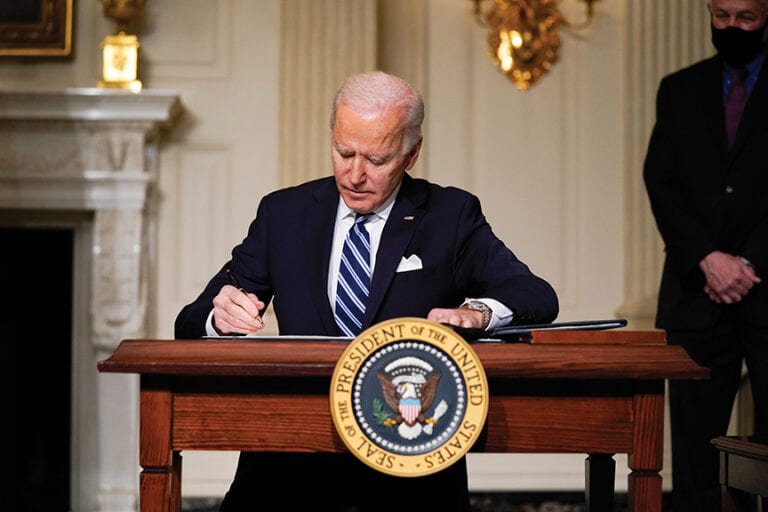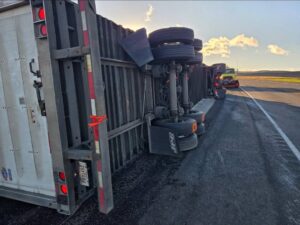If there was any doubt as to what the next four years holds for America’s fossil fuel economy, President Joe Biden erased them all with a swipe of his pen.
The president wasted no time making good on his campaign promise to radically reshape how fossil fuels are collected, transported and consumed. Among the first of a historic flurry of executive orders and actions he signed in the first two weeks of his term were the cancellation of the Keystone XL pipeline extension and initiating steps toward tougher regulations over oil and gas operations.
Proponents of the measure called it a bold first step in addressing climate change. Critics decried the loss of thousands of jobs (up to 12,000 by some estimates attributed to Keystone alone) and an economic hit that easily runs into the billions. The negative impacts include both directly displaced workers and those in affiliated industries such as pipe manufacturing, storage and, yes, transportation.
As the oil industry licks its wounds over the actions, the fracking industry braced for what could be headed its way. Thus far, the jabs from the White House have been relatively light, limited to fracking bans on federal land, according to Thomas Jacob, vice president of Rystad Energy in Houston.
“We spent a lot of time looking at that, and our conclusions were in the immediate term that you would just see activity and capital migrate to nonfederal lands,” he said. “There wouldn’t be a significant impact, at least in the U.S. in 2021. You wouldn’t see activity just dropping dead or dropping off significantly. You would see it be driven more by the oil price fundamentals, other than a regulatory response from the government.”
Jacob contends that in the near term, the aftershocks of COVID-19 would be far more disruptive to fracking production cycles and profitability than what comes out of the White House.
“All of the operators were in so much uncertainty that everyone went into their shells a little bit,” he said. “When COVID-19 hit and activity was plummeting, the supply chain companies … take a huge hit. We did see a lot of capacity coming off on the trucking side because of all of that.”
After that initial shock to the economy, industry expert were able to better evaluate the situation, Jacob noted.
“Once things cleared up a little bit more and there was a little bit more visibility into what was really happening, you saw a lot of frack fleets being put back to work in the third quarter,” he said. “Obviously, the second quarter was the bottom, with respect to completions activity. But then there was an uptick in activity — and when there is a sudden uptick in activity that is more than what people were expecting, there is a shortage of drivers and you see pricing on the trucking side going higher. That’s exactly where we’re at right now.”
Chris Thropp, president of Pennsylvania-based Sage Corp., which operates Sage Truck Driving Schools, disagreed, saying he expects a more immediate impact on the number of trucking jobs directly related to fracking.
“My general judgment, given that they will be banning fracking on federal land and making the whole regulatory process for oil and gas more difficult, is there are going to be fewer and fewer jobs for truck drivers. That’s a shame because they really are good jobs and that’s what really has attracted people, they can make a good amount of money,” Thropp said.
“We had people coming from out west who already knew they were going to go to North Dakota and West Texas, they had jobs waiting for them and they were really very high paying jobs,” he continued. “I do anticipate, given the kind of regulatory clamp that they’re going to put on fossil fuel generally, you’re going to see less opportunity for drivers.”
Thropp said that from the enhanced regulatory landscape governing fracking and other fossil fuel production, it’s a short hop to other regulations in the name of environmental quality. These, he said, will potentially be equally difficult for the industry to absorb.
“We’ve already seen the impact, particularly the emissions standards on trucks, because the diesel particulate filters (DPFs) have been very difficult to deal with,” he said. “Especially for students, where our trucks don’t run at highway speeds and temperatures, the DPF doesn’t really work. We have very expensive repairs as a result of that. That’s just one example of what’s occurring with environmental regulations that aren’t thought through very well.”
According to a report last November by the International Transport Forum (ITF), freight accounts for 7% of total global CO2 emissions, with trucking being the largest contributor. Given this statistic, the industry hasn’t been standing still when it comes to modifying equipment and protocols to improve its environmental impact, such as exploring creative ways to reduce miles logged either while empty or at less-than-truckload. Empty miles are estimated to have generated about 17% of greenhouse gas emissions in the U.S. in 2017, per Convoy Research.
Greener trucks are also being developed by several automakers, with Daimler, Volvo and even Tesla at various stages of testing electric models. The Western States Hydrogen Alliance is among entities pushing hydrogen-electric engine technology through various partnerships, while other companies are exploring ways to leverage renewable natural gas (RNG) technology.
Advanced technology that helps drivers lock in on optimal speeds and acceleration and which rely on sensors for everything from tire pressure to aerodynamics are also expected to greatly improve fuel efficiency — all of which, Thropp said, comes at a cost.
“I think there’s no question that climate change is going to be a big focus of the Biden administration, and I think there are a lot of unknowns there in terms of equipment,” he said. “For our particular business, as electrification takes place and diesel engines are slowly phased out and electric motors and electrified vehicles are developed, the whole training program has to be reassessed. That’s going to be an enormous change.”
Despite all of this, Thropp remains optimistic overall about the future of truck driving as a career.
“What drives people to go into this business, mostly, is trucking provides a good income, and it’s not a very long tail on the training time,” he said. “There are definitely some developments on the horizon, like automated driving, that could end up attracting a lot more people. Newer trucks that have automated transmissions and are safer and more comfortable could end up attracting people to the industry.”
In terms of driver training and the demand for drivers, Thropp described his view as “bullish.”
“I think no matter what the technology is, (trucking is) a very good job, regardless of whether it’s diesel or electric trucks,” he stated. There’s going to be a big demand for drivers.”
Dwain Hebda is a freelance journalist, author, editor and storyteller in Little Rock, Arkansas. In addition to The Trucker, his work appears in more than 35 publications across multiple states each year. Hebda’s writing has been awarded by the Society of Professional Journalists and a Finalist in Best Of Arkansas rankings by AY Magazine. He is president of Ya!Mule Wordsmiths, which provides editorial services to publications and companies.
















I want a green job and I want it now!